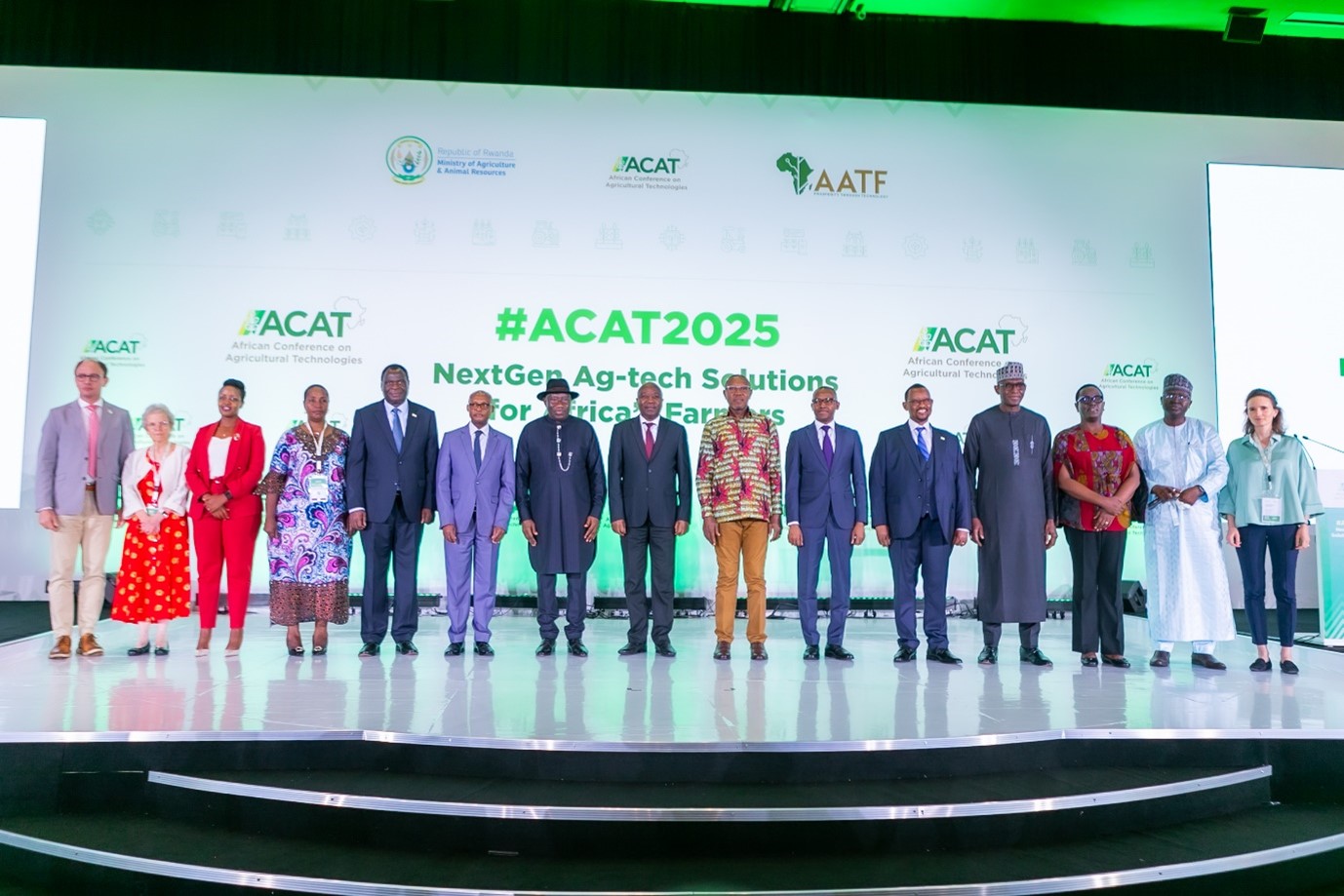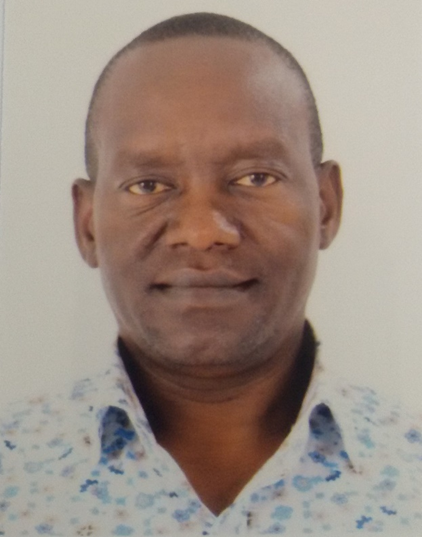
Kigali, Rwanda, 10 June 2025: The second edition of the African Conference on Agricultural Technologies (ACAT) has officially kicked off today, with speakers issuing a rallying call for increased investment and stronger partnerships to support the sustainable adaptation andadoption of agricultural technologies.
The four-day event running from 9-12 June 2025, is co-hosted by the Government of Rwanda, through the Ministry of Agriculture and Livestock Resources (MINAGRI), and the African Agricultural Technology Foundation (AATF), under the theme: “NextGen Ag-Tech Solutions for Africa’s Farmers.”
“We need supportive ecosystems — including enabling policies, investments in infrastructure, access to finance — and, most importantly, the voices and agency of farmers themselves must shape the solutions we develop and promote,” said H.E. Dr. Édouard Ngirente, Prime Minister of the Republic of Rwanda as he presided over the official opening ceremony today in Kigali.
He urged all the stakeholders attending the conference to use the ACAT platform to not only share knowledge but also forge practical partnerships that can scale proven innovations and bring real transformation to smallholder farmers who are the true custodians of Africa’s food systems.
“Let us remember that technology is not just about tools and platforms — it is about people. It is about a farmer, young or old, in a rural village using a mobile phone to check crop prices. It is about a young innovator developing a drone to monitor pests and diseases. It is about a continent that believes in its capacity to feed itself and to thrive,” added H.E Dr. Ngirente.
Addressing the gathering, H.E Dr. Goodluck Ebele Jonathan, GCFR, Former President, Federal Republic of Nigeria, said “Africa can turn around some of the current challenges facing its agricultural sector. However, he maintained that no single country, institution, or actor can transform African agriculture alone.
“Transforming Africa’s agriculture can only happen if countries and institutions in the region collaborate across borders and sectors. African governments must work hand-in-hand with private sector players, research institutions, civil society, and most importantly, with the farmers themselves to birth and sustain a new era of farming and food production. It is a high-paced era that leaves no room for excuses. Africa must make progress and move forward,” noted Dr. Jonathan.
He pointed out that the future of agriculture on our continent is intricately tied to our ability to embrace and scale available and emerging technology. These technologies range from precision farming and satellite imaging to drone technology and artificial intelligence, digital tools and can revolutionize the sector.
“We are already witnessing promising innovations in this regard across the continent. In Nigeria, Kenya, Ghana, and Rwanda, tech-driven platforms are connecting farmers to markets, providing weather forecasts, and facilitating access to credit. Yet, for these innovations to scale, we must deliberately invest in rural infrastructure, digital literacy, and affordable connectivity,” he stated.
Hon. Dr. Mark Cyubahiro Bagabe, Minister of Agriculture and Animal Resources, Republic of Rwanda, emphasized that putting farmers’ needs and preferences first is a paradigm shift. It means placing smallholder farmers, the unsung heroes of our food systems, at the center of all decisions, investments, and innovations. It involves listening to their challenges, valuing their traditional knowledge and wisdom, and co-creating solutions that empower them to enhance productivity.
“Our policies and programs in Rwanda are based on the knowledge that providing farmers with the necessary resources, information, and support networks is essential for sustainable development,” he said.
He pointed out that Rwanda’s agricultural transformation agenda has been informed by a farmer-centric approach, which ensures that useful innovations are accessible to farmers.
Dr. Canisius Kanangire, the Executive Director of AATF, noted that when farmer-centered technologies are implemented within a supportive and enabling environment, they significantly increase productivity, improve livelihoods, and drive economic empowerment.
“For over two decades, AATF has coordinated the formation and implementation of public-private partnerships aimed at facilitating development and access to agricultural technologies that address production challenges, enhance yields, and contribute to the continent’s economic growth while enhancing community health and wealth.
Despite progress in research and technology development, the diffusion of these innovations to end-users, especially farmers, remains limited. Persistent bottlenecks are preventing the delivery of these innovations to market, which diminishes the return on investment in agricultural R&D and undermines the intended impact.
“Addressing these challenges requires deliberate action by high-level decision-makers and institutions across the continent to improve value chain optimization and facilitate intra-African trade,” Dr. Kanangire added.
ACAT will continue to provide a critical platform for stakeholders who are committed to advancing Africa’s socio-economic development and food security through agricultural innovation. It stimulates conversations on sustainable pathways for developing, transferring, and adopting agricultural technologies among smallholder farmers to achieve rural economic transformation.
The Conference has brought together over 800 delegates drawn from the African continent and beyond. They include government representatives, industry thought leaders, policymakers, technical experts, private institutions, farmers, women, and youth. The convening is expected to build momentum towards action on current discussions and recommendations on the importance of the utilization of innovative agricultural technologies.
———————————————————–
For further information please contact:
• George Achia, Communications Officer, East and Southern Africa, AATF; g.achia@aatf-africa.org, +254 785334163
• Eugene Kwibuka, Agriculture Information & Communication Programme Manager, MINAGRI, E: ekwibuka@minagri.gov.rw, +250788490241
About ACAT
ACAT is the premier platform for advancing African agriculture technology transfer and advocating for the uptake of innovations. The conference will provide a fitting platform to highlight the broad range of concerns associated with getting innovative technologies into the hands of farmers. It will also provide an opportunity for indepth discussions and consensus building on barriers to technology development and transfer and generate higher policy level interest at the continental level to resolve the identified challenges.
About AATF
AATF provides farmers in Sub-Saharan Africa (SSA) with practical technology solutions to overcome farm productivity constraints. Founded in 2003, AATF is driven by the vision of a prosperous, resilient, food and nutrition secure Africa, where smallholder farmers’ livelihoods are transformed through agricultural innovations. AATF is active in 24 countries in East, Southern and West Africa. For more information, visit: www.aatf-africa.org
About MINAGRI
The Ministry of Agriculture and Animal Resources (MINAGRI) has the mission of promoting the sustainable development of a modern, efficient and competitive agriculture and livestock sector, in order to ensure food security, agriculture export and diversification of the productions for the benefit of the farmer and the economy of the Country.






















































































